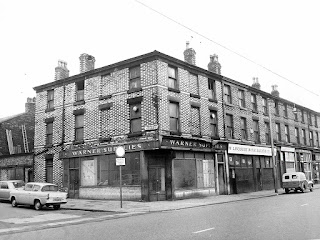John Winchester was a 27 year old engine fitter for the Midland Railway Company and worked at Rice Lane station. He lived at 18 Buchanan Road with his 31 year old wife Mary and three daughters Gertie (5) Flora (2) and Ida (11 months) and his family were described by the Liverpool Echo as 'exceedingly quiet and well regulated people.'
Following the birth of Ida, Mary's health suffered and she often complained of pains at the back of her head. She would tell John that if she were to die then she would prefer her children to go first. She rarely opened the blinds and was convinced that her neighbours were conspiring against her and that her mother was still alive.
On 27th November 1893 John left for work at 6am and Mary seemed fine. She took her children out for a walk in the afternoon and at about 5pm sent Gertie to her grandfather's house in 61 Hertford Road, Bootle, about half a mile away. Whilst she was there, she drowned Flora and Ida in the dolly tub, which was usually used to do the laundry. When Gertie returned, she took him to John's workplace and said to him 'Here is Gertie, the other two are gone.'
John took Mary and Gertie to his father's house in Bootle then they all went to Buchanan Road. John's father asked what she had meant and she directed him to the back kitchen, where he found both children lying face down in the dolly tub, having obviously been dead for some time. The police were called and Mary was taken to Walton police station, where she remained until her first appearance at the County Sessions House in Islington on 29th November.
 On the same day as Mary's first court appearance, the inquest was held at the Queen Victoria Hotel. John's father, also called John, broke down as he described how the bodies were as cold as ice when he found them. Eliza Blundell, who lived opposite in number 19, said she asked Mary why she had drowned the children and she replied 'I'd rather them be dead than called bastards' and then that another neighbour had been telling John that she had been having affairs with other men. The neighbour concerned and John both said that these allegations had never been made. A police officer confirmed that John had once expressed his concern for Mary to him, as she had been out wandering all night.
On the same day as Mary's first court appearance, the inquest was held at the Queen Victoria Hotel. John's father, also called John, broke down as he described how the bodies were as cold as ice when he found them. Eliza Blundell, who lived opposite in number 19, said she asked Mary why she had drowned the children and she replied 'I'd rather them be dead than called bastards' and then that another neighbour had been telling John that she had been having affairs with other men. The neighbour concerned and John both said that these allegations had never been made. A police officer confirmed that John had once expressed his concern for Mary to him, as she had been out wandering all night.
Mary was tried at the Liverpool Assizes before Mr Justice Day on 14th March 1894. Doctors from Walton Gaol and Rainhill Asylum both said that the children had been well loved and cared for and that at the time the murders were committed, Mary was of unsound mind. Justice Day told the jury that there was only one conclusion they could come to and Mary was found guilty, but not responsible. She was detained at Her Majesty's pleasure.

















